Gun Violence
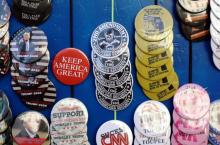
We must carefully observe and acknowledge that many black and brown people consistently witness the senseless deaths of individuals at the hands of racists, supremacists, and those inflicting direct harm on Christian and non-Christian houses of worship.
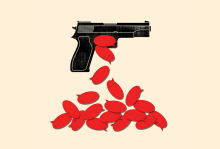
LIKE MANY PEOPLE, I have spoken out more times than I can count under the literal and metaphorical banner of “Silence Is Violence,” my voice growing louder and louder in the past several years.
Yet recently, on one matter, I found myself having fewer words, not more. Gun violence rendered me mute.
The death counts that rise in real time. The fact that before we have comprehended one shooting, another has occurred. The relativizing of value and shifting calculus of loss we have begun to accommodate this “new normal.” The reality—contrary to what one would think based on media attention and political rhetoric—that mass shootings account for less than 2 percent of U.S. gun violence (suicides, by contrast, account for nearly 66 percent).

It’s not much to make 100 stoles when up to 100 people die each day in this country from gun violence.
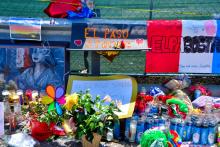
“Amor Eterno,”or Eternal Love, was written in 1984 by the famed Mexican singer and song writer Juan Gabriel, or JuanGa, after his mother passed away. It has become a standard that is played at funerals, wakes, get-togethers, and even restaurants across the U.S., Mexico, and the world to remember family and loved ones who have passed away.
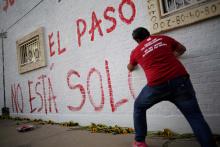
Some Latinx people have known — and others have suspected — this land is not safe for us, but the extent to which that suspicion has been confirmed in El Paso is terrifying. The perpetrator in this massacre was deliberate in his plan to counter the “Hispanic invasion.” It’s tempting to believe all this has been incited by the current president’s violent rhetoric. But while that rhetoric has added much fuel to the fire, the fire has been burning for a long time.
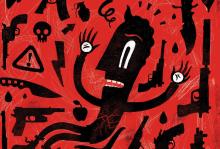
IN THE WAKE of the terrorist attacks on two mosques in Christchurch, New Zealand, earlier this year, Prime Minister Jacinda Ardern seamlessly incorporated Muslim rituals into the public rites of grieving. Her response to the attacks was striking for its cultural competence in engaging Muslim tradition and also projecting it in ways that engaged a broader audience to build empathy and not further structural violence. It allowed for immediate national unity and rehumanizing of the Muslim community.
The prime minister’s response to the violent attacks in New Zealand pointed out the importance of extending interreligious education to state actors.
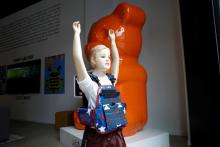
"The reactions are full spectrum from shock to upset to being angry, but not angry at what I'm doing, angry at the stark fact that this could be a reality," the artist, who does not reveal his real name, said in an interview on Monday.

Do you remember where you were four years ago when you heard the news?

The news on Friday was devastating: There had been yet another mass shooting, this time in Virginia Beach, and 12 people were killed. Many of us had the same painful reactions of grief for the families, fear that this could happen to someone I love one day, anger at the gun manufacturers whose influence through the NRA makes them complicit in both the mass shootings and the daily epidemic of gun violence.

I had worked with so many patients and families who had suffered trauma and crisis, especially families who had lost someone to senseless gun violence, but it appeared my training didn’t come into play for myself. I walked around my apartment, drinking coffee and smoking cigarettes, in agony. Then my chaplain hat popped up. I told myself, “Sharon, you know hours of waiting to hear news about someone usually means the patient is dead.” The reality of it all was shattering.
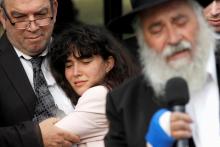
This twisted hate of anti-Semitism isn't the logical end point of my tradition but rather a perverted version of it — a version that has flourished before but has never been right or faithful.
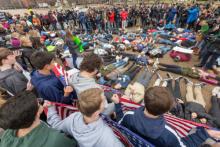
Prayer in the fearful context of gun violence is mysterious to me. I’m still surprised the first thing through my mind, huddled in a classroom corner was this: Praise God from whom all blessings flow… The doxology. Without knowledge of who fired the shot that echoed through the hall, or if the footfalls beyond the door would bring security or more chaos, I had, amazingly, some peace from this liturgical breath prayer. I gripped my friends’ hands and asked God to intervene - to save the shooter who was a child lost and in danger.
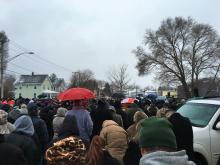
Two days after a brutal workplace shooting in the Chicago suburb of Aurora, where five were killed and six were injured, over 1,000 people joined together for a prayer vigil at the Henry Pratt Company plant, filling the street near the building where the shooting occurred. As several local pastors shared prayers with the huge gathering of mourners, the only sounds that broke the silence between prayers were quiet sobs. Beside a gate connected to the plant, people placed flowers, candles, and signs.

One year after the Valentine's Day massacre inside a Florida school, students and families leading a nationwide push for gun safety will pause on Thursday for the anniversary of the deadliest U.S. high school shooting.
Many students were expected to stay home from a shortened class day at Marjory Stoneman Douglas High School in Parkland, Fla., where a former student with an assault gun killed 17 people on Feb. 14, 2018.
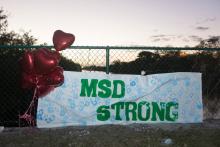
This week, scores of people will once again experience the grief of missing loved ones who were cut down by a deranged young man with multiple deadly weapons in the high school he shared with his victims. The Parkland, Fla. mass shooting at Marjory Stoneman Douglas High School, which killed 17 people and injured 17, joins the 2012 Sandy Hook Elementary School shooting, which wiped out a classroom of precious children, as two of the most horrific moments in American history. The irony that the Parkland slaughter was on Valentine’s Day only increases the suffering. While many will celebrate having and enjoying their loved ones in their lives, the Marjory Stoneman Douglas High School survivors will only feel afresh a terrible vacuum.
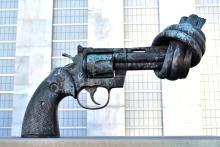
Because the violence of the past was so bad, supposed lesser forms of violence seem less worthy of deconstruction. Toxic masculinity and gun violence are fruits of the same legacy. While it is much easier now to say that slavery and genocide were evils, we have failed to cut them off at their roots, the roots that reek of manipulated biblical texts, hyper masculine domination, and antiquated assumptions about gender. We cannot expect that simply acknowledging the events that resulted from toxic masculinity in the past will deconstruct the assumptions and values that created it to begin with.

In an effort to help our family grieve the loss of our beloved Vickie Lee Jones, a preacher told us that it was God’s will that a white man named Gregory Alan Bush shot her to death in the parking lot of a Kroger grocery store outside of Louisville, Ky. because, as a witnesses implied, she was black.
It was not.

As a woman of faith, I urge my fellow clergy members and faith leaders to join me in standing in solidarity with the transgender community. Christianity tasks us to appeal to people’s hearts and to stand up for the most marginalized in our society. And this is why we cannot afford to remain silent on the hate that permeates American society, and the lax gun laws that help make it fatal. We must remind others that hate has no place in our society.

We try to make sense of hate,
try to trace the line
of white supremacy.
We see that though we’ve come so far,
it’s not so far that we’ve come.
So we breathe and remember:
Jesus wept.
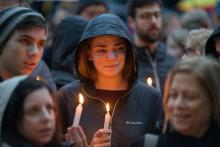
O God, this day we grieve your children who were lost,
and we, as one, are horrified by hatred’s cost.
For people loved by you— your children, called and blest—
were murdered on their Sabbath Day of prayer and rest.